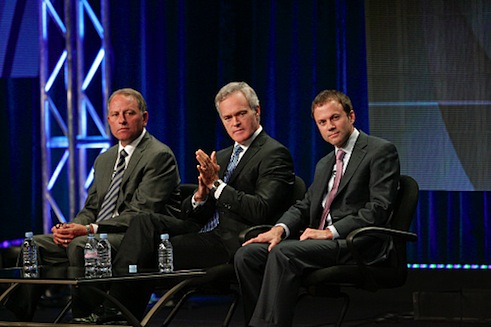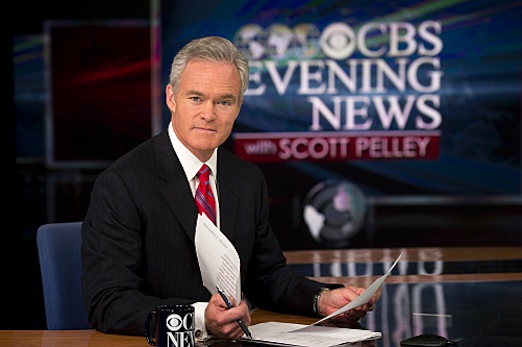Evening News anchor Scott Pelley pledges allegiance to his Texas-bred news values and value system
08/30/11 11:16 AM

By ED BARK
BEVERLY HILLS, Calif. -- He's the upright Nelson Eddy of CBS News, an avowed straight shooter who wouldn't look at all out of place in a Royal Canadian Mountie uniform. Even though he's from Texas.
Yeah, that's a dated visual, but it still suits Scott Pelley. The former KXAS/WFAA reporter, who became anchor of the CBS Evening News on June 6th, clings to old-school traditions with the same zeal Lady Gaga devotes to changing her look.
"I started in this business at the age of 15 as a copy boy at the Lubbock Avalanche-Journal," Pelley, 54 told a hotel ballroom full of TV writers earlier this month during CBS' portion of network TV's annual summer press tour. "And I grew up in this business during a time when the values of CBS News were spread more widely throughout journalism in America. And it is just part of my DNA to drive stories right down the middle and to listen to all opinions. And after you've written the script, to ask yourself, 'Have we been fair to everyone?' It is literally the way I grew up as an individual, and it's the only way I know how to do this."
It's easy to believe him. In fact, it's virtually impossible not to. The idea of Pelley intentionally slanting a story seems as preposterous as The Rolling Stones doing a polka album. And the troops at CBS News seem primed and ready to march with him after five years of Katie Couric's morale-sapping star turn. Here's a guy, after all, who balked at having his name in the title of the CBS Evening News. The division's president, David Rhodes, vetoed that notion. But off-camera, the CBS news room now bears a sign reading, "The CBS Evening News With All of Us."
"In the 30 years I've been at CBS News, I really can't remember a time when the place was as invigorated and excited and optimistic and confident," said chairman Jeff Fager, who also is executive producer of 60 Minutes. "And we're happy to report we've seen some viewer growth as well."
Well, a little at least. In Pelley's first week as anchor, the CBS Evening News averaged 5.7 million viewers, still a distant third behind the NBC Nightly News (8.2 million) and ABC's World News (7.1 million).
In the latest ratings week -- Aug. 22-26 -- the Evening News averaged 6.1 million viewers in what was an eventful period of storm buildups and the liberation of Libya. But World News also made gains, with 7.7 million viewers, while Nightly News increased its audience to 8.8 million viewers. So in this three-horse race, the Evening News remains something of a nag, even with a hard-charging jockey in the saddle.

Pelley, married for 29 years for former KXAS reporter Jane Boone, worked briefly for the Fort Worth-based NBC station before joining WFAA in 1982. He remained there until 1989, when CBS News came calling and Pelley headed East. His taskmaster/mentor at WFAA, late news director Marty Haag, ultimately won a Peabody Award for his long and prosperous tenure at WFAA.
"Everything that I learned from Marty Haag and (former assignments editor) Bert Shipp at WFAA are lessons I employ at the Evening News every day," Pelley said in a brief post-session chat before being whisked away to do a pre-arranged satellite interview for that night's broadcast. "WFAA was the greatest training ground possible for a young correspondent. The traditions of news under Marty Haag were the highest that you will ever see. And that informed everything we did at WFAA."
Told that one of his former WFAA running mates, Gary Reaves, had just retired, Pelley said he'd heard about that, and "it's a worry when your colleagues start to retire around you." But he's only just begun at the CBS Evening News, where two of his predecessors in "The Chair," Bob Schieffer and Dan Rather, continue to work well into their 70s.
All three are Texas natives. And Walter Cronkite cut his journalism teeth in the state, both as a student at the University of Texas and a cub reporter in Houston.
"Well, America loves Texans," Pelley said not altogether seriously. "And I think that is something that CBS News has recognized for a long time."
Pelley, who attended Texas Tech University but did not graduate, served his TV journalism apprenticeship "at a little wood-burning station (KSEL-TV) literally in the middle of a cotton field," as he recalled. "The people that I grew up with, the adults in my town, were the people who survived the Dust Bowl and stuck through it and never left. And you learn something from those people about family, about honor, about sticking to it. And I'm very, very proud to have come from that heritage."
Unlike many of his colleagues at CBS News, Pelley does not recoil when asked about his relationship with Rather. After leaving the network under a George W. Bush "Memogate" cloud, Rather sued for wrongful termination and eventually lost. But he continues to do some first-rate reporting for Mark Cuban's HDNet, where he'll hit the five-year mark this fall.
Pelley said that his first note of congratulations after being named CBS Evening News anchor arrived in one of Rather's signature gray envelopes. "Congratulations. Well done and well deserved," it said.
"Dan was a great mentor of mine, a great friend of mine," Pelley added. "I hate the way that it ended. But he will always have that very important place in CBS News and our history."
Pelley is now writing his own history while pledging allegiance to what some see as a stuffy, antiquated way of presenting the news without any built-in points of view. MSNBC president Phil Griffin, for one, says that his network's ratings gains are the result of taking a "progressive" (left-of-center) stance in its coverage while Fox News Channel remains steadfastly on the right. Occupying the center of the news teeter totter just doesn't work anymore, he contends.
"Well, you can do that," Pelley shot back. "And it does work. And the audience . . . has been flocking to it. We are driving this broadcast right down the middle of the road because we think that's what the largest number of people in America want to see. It's a basic tenet of the ethics of CBS News, and it's the kind of thing we rely on every day."
The proprietors of the NBC Nightly News and ABC's World News would say the same of their approach. And so far they're still winning the dinner hour newscast wars while Pelley and the Evening News hope to slowly chip away and take CBS back to the top.
If that ever happens, it will be via a combination of rock-solid storytelling and a dogged anchor's vision of his network's storied past as the only acceptable blueprint for its future.
